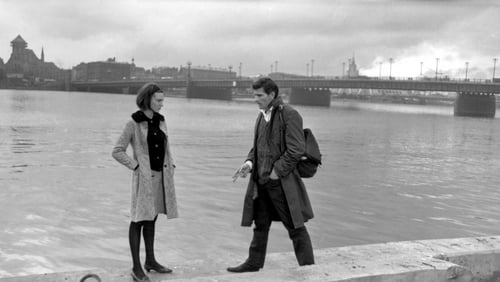
Writer
A documentary about farmers in the Latvian countryside.

Writer

Cezars Kalnins, portrayed by "Latvian Harrison Ford” Uldis Pucitis, installs telephones by day and composes pop songs by night. The puritan Soviet censorship deems Cezars’s lyrics "unsuitable and frivolous” and "unfit for the Soviet youth”. In fact, it can be argued that this assessment matches the opinion of the Soviet cinema authorities in regard to this film as a whole, since "Four White Shirts” was immediately banned and released in cinemas only in 1986. The creative boldness and stubbornness, evident in both Cezars’s bitingly ironic verses and the film’s unconventional narrative structure and fresh, new-wave-inspired mode of expression, turned out to be equally problematic for the hero and for the film itself, as well as for its director whose representation of the actual mechanisms of Soviet censorship ended up too realistic for his own good.

Scenario Writer
A Latvian poetic documentary about the town Kuldīga.

Writer
"A humorous story about the arrival of summer offers insight into the everyday lives of a town's inhabitants. An ironic voice-over, written by Armīns Lejiņš, comments on the events attentively shot by Uldis Brauns in the town. The scenes include a fire drill, a wedding, a school graduation, and other episodes of town life. Brauns and Lejiņš originally planned to make a fiction film, and filmed in Kuldīga, but the project was not realized at the time (the script was later used for Aivars Freimanis’ Kuldīga Frescoes, 1966), and was incorporated into this short film." - VERZIO International Human Rights Documentary Film Festival

Writer
"The Worker is the last part of the trilogy, and differs somewhat from the rest. Rather then telling of yet another building site, the film centers on the abstract image of the Worker. The voice-over commentary describes the meaning of work in Soviet life – the role and significance of each individual. Melting an old tank at the smelting plant serves as a metaphor for peace that enables all workers to fully dedicate themselves to productive construction." VERZIO International Human Rights Documentary Film Festival

Writer
"The Construction is the second part of Uldis Brauns’ trilogy. It focuses on the construction of Daugavpils' synthetic fibre factory, and includes well-balanced, wide-angle shots and dramatic camera angles. The soundtrack is used imaginatively to create new meanings, and to construct metaphor like a musical artwork. The Construction also uses live interviews recorded on set; Armīns Lejiņš, the trilogy's scriptwriter, appears on camera interviewing people." - VERZIO International Human Rights Documentary Film Festival

Writer
The Beginning is the first installment in Brauns’ trilogy dedicated to large-scale construction development in Latvia. It captures the building process of the Pļaviņas hydroelectric station on the country’s largest river. Observation of the builders, drivers, and engineers at work highlights the human aspect of construction work. The film’s title carries symbolic weight – this is the first Riga school film, Brauns’ directorial debut, the first widescreen picture made in Latvia, and the first part of a trilogy.




